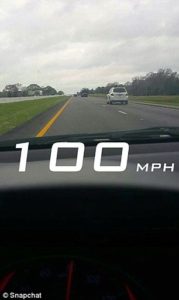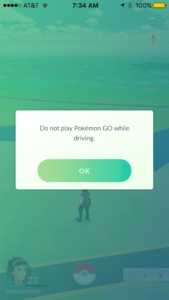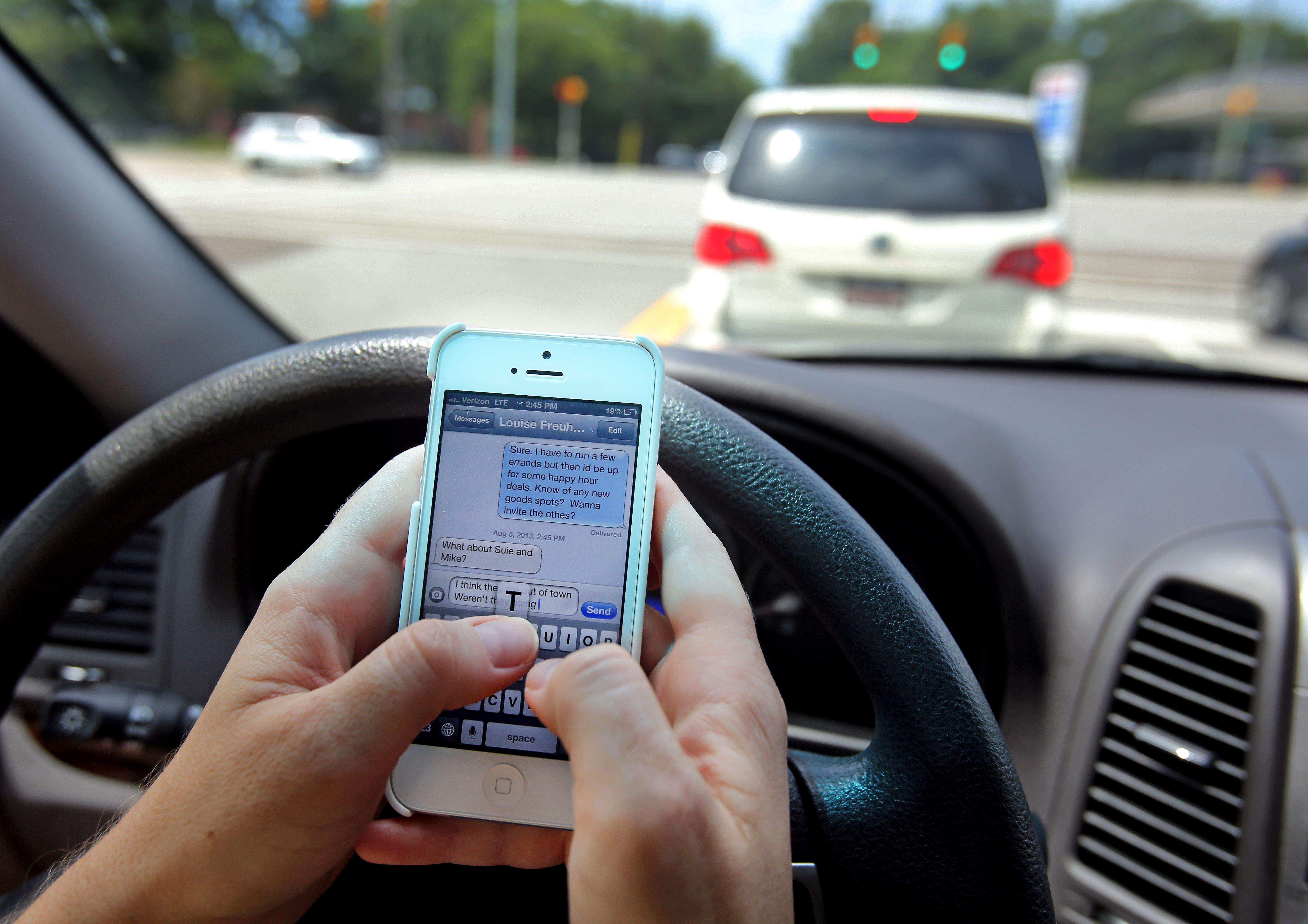The new Massachusetts hands-free driving law is a complete ban on any use of a handheld mobile device while driving. It takes effect on 2/23/2020.
The only authorized use of a phone behind the wheel are:
- Hands-free phone calls, and
- Using a GPS navigation device while your phone is mounted to the dashboard.
Penalties for distracted driving if you are stopped and ticketed are:
- First Offense: A fine of $100
- Second Offense: Fine of $250 and a required distracted driver education course.
- Third or Subsequent Offense: Fine of $500 and a surchargable event on your auto insurance.
—
In Massachusetts, it is a ticketable offense to text while behind the wheel, under statute G. L. c 90, Sec13B. The penalty is a $100 fine for a first offense.
As of the date of this new law coming into effect, it will be illegal to hold a phone in your hand for calls or other active uses.
Last April was “distracted driving awareness” month in Massachusetts and nationwide. This means there will be increased high-profile media campaigns and news about texting while driving. In addition, many Police departments get extra Federal grants from NHTSA to pay for patrols, and are looking to write citations to raise awareness about texting while driving and other distractions.
Any electronic messaging via a mobile device, including texting, reading or composing an email, or internet access or communication via phone is not allowed by law.
Distracted Driving and Facebook Live

There have been many recent cases of people broadcasting on Facebook live while driving, and getting in car accidents. This can be a mere distraction issue, where you are talking to your audience in the video and not focusing on the road.
But it some cases it is a deliberate effort to drive recklessly and dangerously and “show off” your high-speed or dangerous driving.
Distracted Driving and Snapchat
Snapchat has a speed filter that actually calculates how fast you are moving at the time you are shooting your 10 second video, or “snap”. Activating this filter can be considered a “challenge” unfortunately, and a dangerous one.
Distracted Driving and Pokemon Go

Pokemon Go has been around for a few years but is still popular for mobile smartphone users. It was one of the most downloaded app for iPhone and Android devices in 2016.
The game requires you to keep the app open to catch Pokemon, load up on supplies from pokestop.
While the game is intended to be played while walking, most game functions do work while moving at driving speeds. When a new Pokemon pops on the screen, the player is alerted, and it is a huge distraction to look on your screen, and certainly could be very dangerous to do so while behind the wheel.
Police can easily spot driving pattern of people playing while driving (slowing down or stopping at predicted spots, pulling over quickly, slamming on the brakes late, etc.)
You can bet that lots of distracted driving tickets are being written for Pokemon players. Any accident or driving behavior that rises to the level of dangerous or reckless driving will get you a citation for criminal negligent operation of a motor vehicle.
Any game or app will grab your limited attention behind the wheel. Whether it is an augmented reality game or social medial video maker like TikTok, it’s all dangerous if it takes your attention off the road.
Yes, it is illegal as of Feb 2020 to use a phone for voice functions behind the wheel holding a phone to your ear is currently legal, or to hold your phone up to use it for accessing social media or other apps.
Only completely hands-free voice smartphone phone access would be allowed, such as accessing it via Bluetooth, or buttons on your car’s dashboard. And the phone must be mounted on your dashboard by some holding device.
The bill will only allow you to:
Swipe once to engage hands-free voice commands for calls or using the GPS on your smartphone.
Texting while driving itself was originally banned in 2010 under the Massachusetts Safe Driving Law.
Distracted driving can be anything that changes the focus of your attention while operating a motor vehicle. Distracted driving is most commonly associated with electronic devices, texting, smartphones, and using messaging apps (Facebook Live, Messenger, TikTok, Twitter, Snapchat, Instagram Messenger, Whatsapp, or Signal while communicating encrypted messages to your lawyer) or augmented reality games like Pokemon Go and Harry Potter Wizarding World.
But it could also be eating while driving, putting on makeup, changing the radio station or GPS settings, or anything else that distracts your eyes and attention from the road.
If you are actively texting or messaging, then Yes. You are allowed one swipe to engage hands-free voice mode, but that’s it. And it must be mounted on the dashboard or otherwise securely placed.
When you are behind the wheel, in control of your vehicle, even when stopped, you still cannot use your smartphone or electronic device to text.
If the police see you not respond to the light turning green and they see a phone in your hands, they will pull you over and write you a citation.
It doesn’t matter what you are doing, it is not allowed to pick up your phone for any reason, even you just read a quick text, or pick up the phone to answer a Facetime call and then place it down and talk hands-free. 
No, not by itself. It is a civil penalty like most traffic tickets.
However, distracted driving could be the cause of negligent operation of a motor vehicle offense, which is a criminal charge.
If your distraction results in you “acting negligently or recklessly in a way that endangered people” then you could get a criminal citation. The standard for this is very subjective, but if you crossed the white lines, caused an accident or a near miss, the officer could cite you for negligent operation, also known as “reckless driving”.
If you end up being issued a criminal citation for negligent operation for distracted driving, we can help. We handle a lot of these cases.
Make sure you send in the citation within 4 days to request a clerk magistrate’s hearing, where we can often work out a deal to avoid the criminal charge actually being issued.
Not if you can win the case. We recently won a case at a Clerk Magistrate’s Hearing where an 18-year-old struck a telephone pole due to driving while texting, and was charged with operating a motor vehicle to endanger (negligent operation).
As you can see, even with a difficult distracted driving case and a young driver, we can often find ways to make the case that a criminal record would be extremely detrimental to a person.
Advanced preparation, including positive background information and character references, sincere remorse, and a proactive effort to learn from the incident (enrollment in a young driver safety class) can make a difference in getting a good outcome in court. 
If they do an investigation, yes. They can contact your mobile carrier and find out what, if any, data or SMS (text) was transmitting at the moment of the accident.
There are also devices in development like the “textalyzer”. With this technology, the police can ask you to agree to submit your phone to an on the spot test to see if you’d be texting or using your phone right before a crash. There is currently proposed legislation in New York that would compel to you agree to the test, or risk having your driver’s license suspended. Similar legislative and municipal ordinances have been proposed in New Jersey, Tennessee, and Chicago.
Using this technology on the spot, allowing police instant access to your phone’s data and metadata without a warrant would be a serious privacy violation, so we will keep an eye out on any possible usage in Massachusetts.